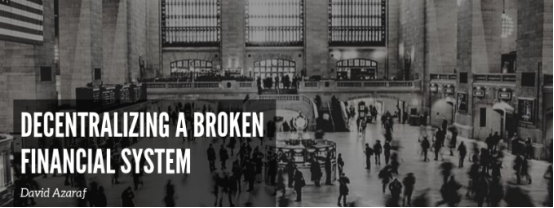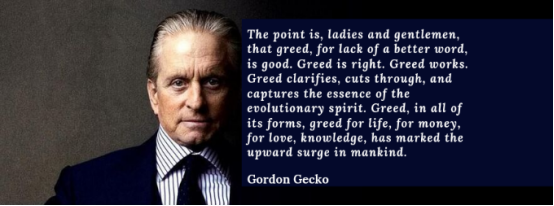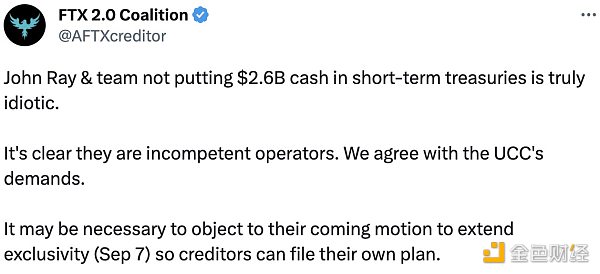Explore: How DeFi Improves the Traditional Financial System
How does the blockchain stop the resurgence of the Great Recession and create a more inclusive and prosperous global economy.

The cyclicality of financial markets is inevitable.
When the economy struggles to keep up with the soaring asset valuations, investors are forced to re-adjust their expectations, indicating that the economy is entering a recession. In the economic environment where consumers dare to spend, those high-quality enterprises that have survived the economic recession and continue to add value have begun to flourish. After the bubble burst, they entered a period of economic prosperity.
- Who is the biggest bitcoin holder: Nakamoto, Winklevoss brothers or "King of encryption" Barry Sylbert?
- Survey: 61 dark net payment status, who is favored outside of Bitcoin
- Not surprising! The Libra Association is considering a “stepped” approach to KYC regulations
This process will cycle, expand, decline, and expand again.
The 2008 financial crisis was not caused by natural laws. On the contrary, this is a story of a breakdown of trust and a potential disaster, but it was too late to discover, all because of the transfer of all control to a few bankers.
At this time, Satoshi Nakamoto released the code for the Bitcoin blockchain, which ushered in a more transparent and inclusive global economy. He observed the financial damage caused by traditional institutions and found that Bitcoin may solve a key flaw in the financial system (the need for trust).
Who should be responsible for the Great Depression?
Since the Great Depression of the 1930s, the global economy has not experienced such a severe recession. The recession from December 2007 to June 2009 reduced US gross domestic product by 6% and the number of unemployed more than 30 million. Not all segments of the population are equally affected, and ethnic minorities and those with lower levels of education are particularly hard hit, and the chief culprit of this disaster has escaped any form of punishment.
The opacity of the financial system masks human greed and ultimately leads to the collapse of the global economy.
At the beginning of the 21st century, the booming real estate market prompted many people to apply for mortgages to realize the American dream of owning a home. The bank bundles these mortgages and sells them to investors in the form of bonds, giving investors the right to receive loans from homeowners. However, different players in the system made a series of serious mistakes in dealing with this new investment category, leading to the biggest financial disaster since the Great Depression.
Commercial banks have issued comprehensive mortgage loans to homeowners with lower credit scores to increase their asset base. These mortgages are called subprime mortgages, usually adjustable interest rates, which start at a super low and then soar to unsustainable levels. Due to the booming real estate market, many individuals with credit problems began to purchase real estate with a large amount of mortgage loans. When the market began to cool down and interest rates began to rise, these subprime borrowers were heavily in arrears.
Although subprime mortgages are inherently destructive, they may be able to contain the damage caused by subprime mortgages if they are not securitized.
It is guilty for investment banks to package these bad mortgages into tradable assets and sell them to investors. As the bull market raged and risk appetite grew, investment banks such as Goldman Sachs, Morgan Stanley and Bear Stearns began to bundle mortgages together to form a new type of high-yield financial instrument – mortgage-backed securities (MBS). . As the underlying mortgage began to deteriorate, investors holding MBS saw their sources of income frozen, causing widespread market panic. Lehman Brothers, the fourth-largest investment bank that managed $275 billion in assets at the time, suffered heavy losses as it entered the MBS market irresponsibly, so that the 158-year-old company lost $3.9 billion in a single quarter. Have to file for bankruptcy.
Without the support of rating agencies, financial giants will not be able to create such a lucrative market for MBS.

Rating agencies are ostensibly responsible for protecting investors from financial misconduct, but are also guilty of supporting unreliable mortgage-backed securities. Standard and Poors, Moody's and Fitch, the institutions responsible for quality control in the financial markets, have given AAA ratings to these mortgage-backed securities, despite the mortgages they contain. Poor quality. According to the logic proposed by the rating agencies, since each security contains many different mortgages, these securities are sufficiently diverse to obtain a higher rating. For whatever reason, they forgot to consider a systemic risk: if the entire real estate market collapses, then everyone will not be able to repay the mortgage, which will lead to a deterioration in mortgage-backed securities. When this exact situation occurs, many people point their finger at rating agencies, accusing them of facilitating customers by rating their investment bank customers AAA for higher fees.
Insurance companies that are “too big to fail” ensure that the biggest risk is US taxpayers, which further exacerbates this risk.
Insurance companies have added an additional layer of risk to the already faltering system by selling credit default swaps (CDS) insurance contracts for these risky securities. If these bonds default, the insurance company will be forced to pay a large amount of money. The contents of the CDS contract are as follows: In exchange, the insured is charged a fixed premium, and if the mortgage guarantee defaults, the insurance company is obliged to repay its debt. When MBS began to fall, insurance companies suddenly found themselves in debt, but did not have enough assets to pay off their debts. In one of the key moments of the financial crisis, insurance giant American International Group (AIG) lost $30 billion in its CDS business. The bankrupt company applied for $85 billion in aid from the government to avoid bankruptcy.
“Doing more bitcoin and shorting bankers” has become the battle slogan of the blockchain industry. The industry is trying to replace the trust and self-interest of the banking system with a decentralized financial system based on trust-free and transparent agreements.
How does DeFi Finance improve the current system?
DeFi's core value propositions for traditional financial systems can be divided into three broad categories: transparency, trust, and incentives.
transparency
Although the law requires traditional financial institutions to disclose their financial data, it is well known that these institutions use some accounting operations to circumvent some financial reporting requirements. In the famous financial warfare case, Enron concealed billions of dollars in debt through accounting loopholes and special purpose entities, which were later exposed in the 2001 bankruptcy scandal.
With the help of blockchain technology, every operation of the main functions of the financial system, whether it is to issue loans, trade derivatives or draft insurance contracts, can be completed on the chain for verification and verification by all.
Ordinary people no longer need to rely on the accuracy of data provided by traditional institutions. Instead, anyone can directly query the blockchain when making financial decisions. For example, blockchain-based mortgage-backed securities will contain a record of each mortgage, and investors can directly assess the health of those assets rather than blindly believing that rating agencies will evaluate them.
No trust
In the field of financial risk management, counterparty risk refers to the possibility of default by one party in the transaction. Trust in counterparties is the foundation of the traditional financial system. For example, an investor who buys a 10-year bond issued by Deutsche Bank must believe that the bank can maintain its solvency for a long enough period to pay interest and capital. However, if the 2008 crisis proves anything, it is that we should not take the immortality of the financial giant for granted. Bear Stearns and Lehmann brothers existed for 85 and 158 years respectively before being dragged down by the Great Depression.
Financial products based on blockchains do not require trust. Instead, they use distributed consensus and smart contracts to eliminate the risk of counterparty by automatically executing the contract immediately by satisfying certain pre-set conditions.
Those who update their books are miners and verifiers who are economically motivated to remain honest, not banks. In addition, smart contract technology allows for trading conditions in smart contracts that are placed ahead of the blockchain. Once these conditions are met, the automatically executed software automatically enforces the terms of the agreement, so there is no risk that either party will violate the promise.
Suppose Bob and Mike sign a simple futures contract. Mike has a car company and Bob supplies him with steel during production. Feeling uneasy about the surrounding economic environment and the prospect of rising steel prices, Mike wants to lock in the steel supply for next month at today's price. In order to do this, he signed a contract with Bob, which stipulates that Mike will have the right to purchase 1,000 tons of steel for $1 million when placing an order next month.
Mike and Bob can lock their assets in smart contracts instead of delivering them with mutual trust, and smart contracts will automatically execute the agreement at the scheduled time while still allowing them full ownership during the contract.
Incentives
If people with high-risk bets on complex financial products can feel the economic consequences of their actions, then the situation in 2008 may be different. In contrast, large banks and insurance companies take on too much risk and can pass risks to investors and customers through complex financial engineering. When the economic situation is good, bankers receive considerable commissions and bonuses. When the economy deteriorates, the people who are most affected by the economic crisis are the people at the bottom of society, not the bankers who caused the crisis.
The decentralized financial system realigns risks and returns by shifting power from the main institutions to the hands of the people.
Individuals who participate in the game rely on this system to survive and have a say in how the system works. For example, the decentralized platform MakerDAO for issuing loans allows its local MKR token holders to vote to determine the rate at which users borrow from the system. MKR token holders directly experience the results of their decisions, and they are motivated to reduce any unnecessary risks and proceed from the best interests of the entire network.
Decentralized finance has created a new vision, a more inclusive, transparent, and resilient financial system that relies on cryptography and consensus rather than humans who are prone to making mistakes. The decentralized financial system may be a breakwater that prevents the next financial tsunami from causing incalculable damage.
Author | David Azaraf
Translation | First Class (First.vip) Annie
Source | First Class Warehouse
Please reprint the information at the end of the article.
We will continue to update Blocking; if you have any questions or suggestions, please contact us!
Was this article helpful?
93 out of 132 found this helpful
Related articles
- Circle transformation: from Goldman Sachs, Baidu sought after, to give up bitcoin payment and change to stable currency
- Defi Sport Enlightenment Project MakerDAO's ambition and brutal struggle
- Babbitt Entrepreneurship + | Luck and strength blessing, how does Taraxa endorse for the blockchain + IoT?
- When the cryptocurrency market is not good, what kind of trading strategy can you use to make a profit?
- Successful breakthrough in the broader market, platform coins are expected to meet the opportunity
- Vitalik: Ethereum 1.0 will become the subsystem of Ethereum 2.0, PoW will lose its meaning
- Token Watch | Ponzi Finance, Negative Interest Rate and Bitcoin






